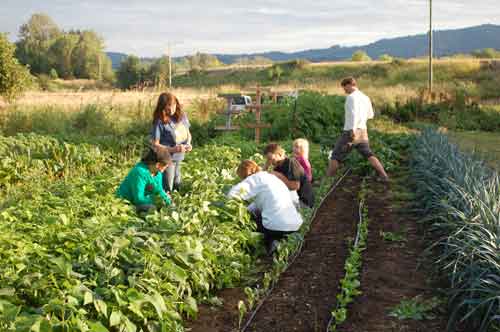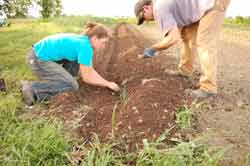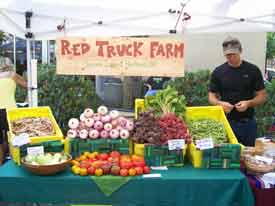
As I drive across this quiet stretch of river on the small, two-lane bridge to Sauvie Island, leaving for now the city of Portland not so far behind, I want to write the story of Red Truck Farm, a 1/2-acre vegetable and dry bean farm dedicated to growing organic food for the local community. I feel we need to hear every story possible about the hopeful, determined, hard working small farmer—their daily mundane but heroic efforts to help grow healthy food for area residents. We need to stay alive and aware and above all hopeful for a future that includes farm-fresh food on the local human scale.
Approaching the farm for the first time, I found myself reticent about barraging Amber Baker and Jason Karnezis, the owners of Red Truck Farm, with questions. Though they had generously given me an open invitation to visit them on their farm, I still felt a bit like an interloper, that my mission in being here was far less urgent than theirs. After all, the sun was already slanting low in the early autumn sky, and the race was on to harvest leeks and beets, tomatoes and chard. There they were, all standing straight and tall and crowded together in their rows like eager schoolchildren with hands raised, hoping they’ll be chosen next – while the sunlight continued to fade ever more quickly, dusk arriving with ever more certainty. Jason in amongst them, alternating between bending over and squatting down to be able to best reach and cut or pry out of the ground the chosen ones. On this occasion, I could not bring myself to interrupt him.
It’s a mean thing for farmers who must also have day jobs to survive (a fact of life for more than half of America’s farmers), having to make farm work fit in that ever diminishing space between the nine-to-five and darkness. Amber and Jason are able to come out to the farm only twice a week, crossing the bridge that separates their farm from their urban jobs and urban life.
“I don’t love it this time of year,” Amber confesses with a tired, mid-September smile. With a sureness and economy of motion she shakes excess water from bundled chard leaves in a slow, rhythmic arc that tosses water droplets across a band of sunlight and gently packs the lush produce in waxed cardboard boxes, each layer of green softly nestled between layers of damp newspaper to keep it fresh.
I am alone here with them on a quiet Tuesday evening, but Fridays are much different: There is an open invitation to Amber and Jason’s family and friends — who they don’t see as much as they would like during the busier times of year — to come out to the farm and help harvest and prepare vegetables for the next day’s farmers market. As the daylight wanes in earnest and dusk truly announces its arrival, coals are lit in the barbeque. When the light is finally too dim for efficient work, harvesting knives are put away and those who have gathered share a meal, toast their efforts with a beer and catch up with the news of each others’ lives. It is a warm and welcome respite from the sometimes almost lonely activity out on the farm, a brief camaraderie and renewal of friendships and community that Jason and Amber are trying to keep in balance with the ever-pressing needs of farming life.
Amber suddenly stops securing the latest bundle of chard leaves with a rubber band and asks, “Did you see the Osprey nest, out on the piling in the inlet?” By now, she has watched the seasons change on this part of the island, the generations of Osprey on the inlet, for nearly seven years. As she drives down the road to her farm she passes the turnoff to Sauvie Island Organics, where she and Jason first met during a two-year farming internship, and can just glimpse the majestic elder Oak on the edge of the fields under which they later held their wedding. She feels tied to this land, in some way indebted to this place that has given her life so much meaning. To start her own farming chapter here is for Amber a significant and special thing.
I suddenly look around for the actual Red Truck that gives the farm its name….okay, so it is not the late 1940’s bright red and rounded fender pickup one might imagine sitting at the edge of a tilled field, resplendent in its role as symbol, maybe with its truck bed planted in a glorious array of brightly colored flowers. It is in truth a late 1980’s maroon Toyota pickup that faithfully keeps running, displaying the bumper sticker, “No Farms, No Food.” Still, this Red Truck Farm, this mere half acre, is a real farm – enormous in concept even though diminutive in size by the agricultural average of four hundred and twenty-five acres. It symbolizes a beginning; the place and the moment that enabled them to step over the threshold from idea to action, from thinking to doing, from the philosophical and theoretical to the tangible. What’s in a name? Everything.
A bridge both joins and separates. The slip of a river, the inlet that houses the Osprey nest, are symbols of the ever-changing quality of this duality. For Amber and Jason, to drive across the bridge to this island is an act of separation from one known world to another. Salaried jobs on one side, capricious farm on the other. Their friends and family on one side, their farm on the other. It’s not a matter of direct oppositions, more like a sweet, sometimes bittersweet kind of schizophrenia that their lives now inhabit, one that they embrace and nurture for all it’s worth.
A fifth-generation Oregonian, Peggy Acott has been actively supporting garden and farming programs in the Portland area for over ten years, as Portland Nursery’s Community Outreach Director, and as a founding board member of the Learning Gardens Institute. More of her writings and photography can be found on the Portland Nursery Community Outreach site.


